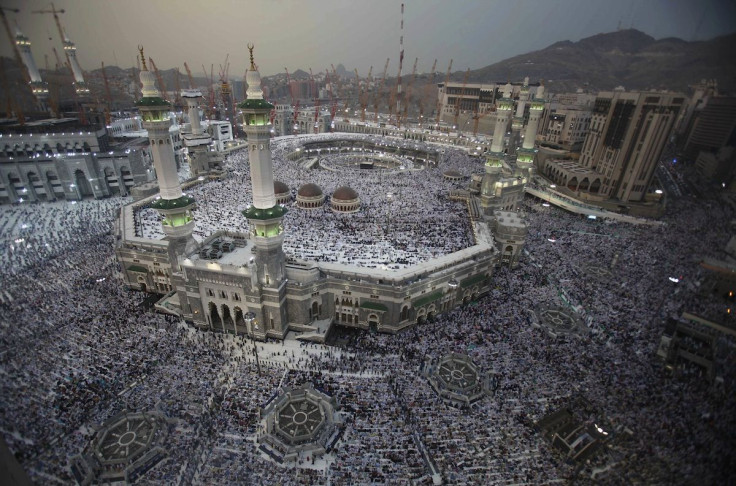Hajj Numbers Down In 2013 By 1 Million Over MERS Virus Fears

Hajj is the world’s largest annual gathering, one of the five pillars of Islam and a journey that all able-bodied Muslims are expected to carry out at least once in their lifetime. But travel advisories over the deadly Middle East respiratory syndrome, or MERS coronavirus, forced roughly a million pilgrims to forgo the trip to Mecca in 2013.
The Saudi Health Ministry announced in July that it would sharply cut back on hajj visas for the young, elderly and unwell, urging them to postpone their pilgrimages in order to curb the spread of MERS. It similarly asked pregnant women and children under 12 to stay away from the annual five-day gathering, and reduced quotas for each country by 20 percent, in part, because of a massive project to expand the capacity of the Grand Mosque.
Hajj placed 1.75 million foreign pilgrims in contact with 1.4 million Saudi pilgrims last year, and officials feared that such contact could prove a deadly mix for a disease that has been, thus far, largely contained within the kingdom. Interior Minister Prince Mohammed bin Nayef said international numbers were down 21 percent to 1.37 million pilgrims from 188 countries this year, while the number of pilgrims from within the kingdom is believed to be half of what it was last year.
The SARS-like MERS coronavirus has infected 136 people and killed 60 worldwide since September 2012, according to the World Health Organization. Though largely centered in Saudi Arabia, doctors have identified MERS cases in neighboring countries and as far away as France, Germany, Italy and the UK. In most instances, the patients either traveled to or were in contact with people in Saudi Arabia, and had preexisting conditions, such as kidney disease or diabetes.
“I think we’re always worried in a globalized world that infection can travel quickly from one country to another,” Keiji Fukuda, WHO assistant director general for health security, said at a news conference in July when Saudi officials first announced plans to limit the number of pilgrims.
“We see that with the evidence of some of the infections in Europe being related to travel to the Middle East. But, you know, when we look at the overall situation, it’s not just the worry about that that we have to take into consideration.”
Scientists still have little understanding of how MERS spreads or why it popped up in the Middle East.
The Saudi Health Ministry began monitoring its borders in July to screen visitors and look for “any person showing any symptom of the virus as defined by WHO.”
A statement, posted on the Health Ministry’s website over the summer, offered “health awareness guidelines” such as washing hands and limiting direct contact with infectious people. The guidelines also mandate facemasks in overcrowded places such as Mecca, and valid certificates of vaccination against meningitis and polio for pilgrims from specified countries. The Ministry reiterated these guidelines in an advisory campaign for pilgrims in the days leading up to hajj.
MERS primarily affects the elderly, children under the age of 15 and those with preexisting conditions. Similar to SARS, which killed 775 people and sickened 8,000 others nearly a decade ago, the coronavirus wreaks havoc on the respiratory system. Patients generally suffer from fevers, coughing and shortness of breath, though symptoms vary.
"The clinical syndrome is similar to SARS, with an initial phase of nonspecific fever and mild, nonproductive cough, which may last for several days before progressing to pneumonia," a study published in the New England Journal of Medicine earlier this year noted. Unlike SARS, however, MERS also causes rapid kidney failure, and more than half of those known to have caught it have died.
“Travelers to the Middle East who develop symptoms either during travel or after their return are encouraged to seek medical attention and to share their history of travel,” WHO said in its advice for travelers. “People with symptoms of acute respiratory infection should practice cough etiquette (maintain distance, cover coughs and sneezes with disposable tissues or clothing, and wash hands) and to delay travel until they are no longer symptomatic.”
Saudi Minister of Health, Abdullah bin Abdulaziz Al-Rabeeah, announced late Saturday that all health facilities were ready for hajj pilgrims, with some 22,000 health workers (3,000 more than previous years) on standby to help the ill or injured. He added that there had been no epidemic or coronavirus cases among pilgrims thus far.
Last Thursday, however, the Health Ministry confirmed that two Saudi nationals had died after contracting the virus, bringing the total number of deaths in the kingdom to 51. The Ministry gave no details as to when the individuals died, but said they passed away in Riyadh, the capital and largest city of Saudi Arabia. It also announced two new infections last week, bringing to 119 the number of people infected in the kingdom.
© Copyright IBTimes 2024. All rights reserved.






















